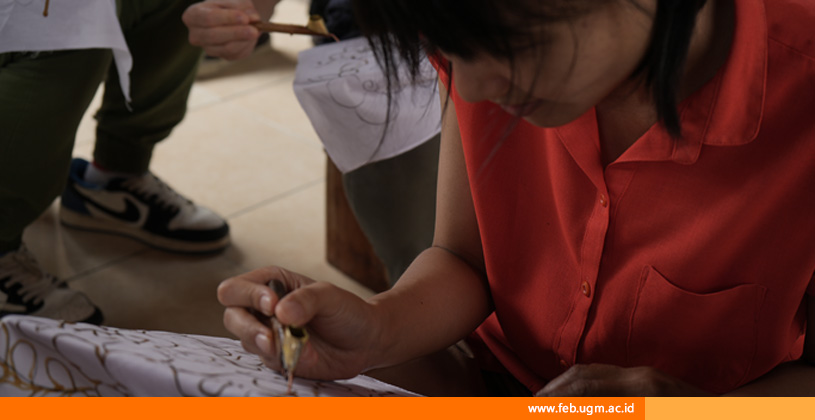Foreign Students Learning Social Entrepreneurship in the Remote Villages of Yogyakarta Through GSW 2024
- Details
- Written by Kurnia
- Category: News
- Hits: 461

Phasiree Thanasin appeared focused as she moved the canting to apply liquid wax following the flower-patterned batik design. Despite her fingers still seeming unskilled in handling the canting, this woman from Thailand did not give up easily. She neatly drew all the patterns, although it took work. Creating handwritten batik is not easy; it requires high precision and perseverance, especially for Phasiree Thanasin, who was entirely unfamiliar with the technique of handwritten batik.
Phasiree Thanasin is one of the participants of the Global Summer Week (GSW) 2024 who is currently on a field trip in Wukirsari Village, organized by the Faculty of Economics and Business at Gadjah Mada University (FEB UGM) on Thursday (18/7). The 30 international students participated in this field trip from various countries, and 56 Indonesian students were spread across ten field trip locations at Village-Owned Enterprises (BUMDes) in Sleman Regency, Bantul Regency, Kulon Progo Regency, and Gunungkidul Regency. Through this field trip, students learn firsthand about social entrepreneurship practiced by the Indonesian community, particularly in the DIY region.
This student from Chiang Mai University took full advantage of the opportunity to explore more about social entrepreneurship in Indonesia, especially in Wukirsari Village, Sleman Regency, DI Yogyakarta. "Wukirsari is a craft village, and here I reflect a lot on the culture of Chiang Mai and Thailand because Chiang Mai is the heart of crafts in Thailand. We have many craft villages similar to this craft tourism," she explained.
She admitted many similarities and differences in culture and in conducting entrepreneurship. In Indonesia, the community is known for its gotong-royong (cooperation) culture, which is also present in Thai society. "In Thailand, people try to do something similar to gotong royong, like the whole village working together," she explained.
Phasiree Thanasin acknowledged that this was her first visit and direct interaction with the Indonesian community. She experienced an extraordinary cultural encounter through the GSW 2024 activities and gained more profound insights into social entrepreneurship in Indonesia. "Through this GSW activity, I can learn more directly about Indonesia," she said.
Desiree Chooi Huien, a student from Nanyang Technological University, expressed similar sentiments. This women from Singapore found the GSW 2024 experience to be a fascinating journey. "I gained experience by visiting foundations and villages to learn more about how entrepreneurship works in Indonesia," he explained.
This field visit opened his eyes to how the Indonesian community tries to blend nature with business and utilize its resources. The community builds firms for their advancement and that of society. "Learning from the seniors in this village has greatly enriched my knowledge," he said.
Desiree Chooi Huien mentioned that Singapore has fewer natural resources than Indonesia. When he saw various things in Wukirsari Village, everything was done naturally and down to earth. "Unlike in Singapore, where everything moves very quickly, in Wukirsari Village, the culture and traditions are robust and are the community's mainstay," he noted.
GSW 2024 is an annual agenda organized by FEB UGM since 2014. GSW covers various forms, including executive talks, lectures, field visits, social entrepreneurship projects, and cultural activities. In 2024, GSW carries the theme "Sustainable Futures: Igniting Change through Social Entrepreneurship and Innovation." The event, which took place over 11 days from July 15-25, 2024, was attended by 30 international students from various countries and 56 students from several universities in Indonesia.
Interview: Mahendra Hermawan S
Author: Kurnia Ekaptiningrum
Sustainable Development Goals








